 One of the stubbornest habits among the nominators of Best Supporting Actresses is the tendency to get all excited about an elder actress's "return" to cinematic prominence later in life. Indeed, a cursory survey of the category discerns the names of some of the most glittering leading ladies of stage and screen -- Sylvia Sidney, Una Merkel, Marjorie Rambeau, Eva La Gallienne, Ann Sothern, Lauren Bacall, Gloria Stuart -- receiving their only nods from Oscar late in life. I must say, I've never exactly minded this particular brand of Oscar nostalgia but it can make for some curious nominations for (especially in the context of the larger career) some unremarkable work. But even unremarkable work from a great actress can be pretty darn good, as is the case with...
One of the stubbornest habits among the nominators of Best Supporting Actresses is the tendency to get all excited about an elder actress's "return" to cinematic prominence later in life. Indeed, a cursory survey of the category discerns the names of some of the most glittering leading ladies of stage and screen -- Sylvia Sidney, Una Merkel, Marjorie Rambeau, Eva La Gallienne, Ann Sothern, Lauren Bacall, Gloria Stuart -- receiving their only nods from Oscar late in life. I must say, I've never exactly minded this particular brand of Oscar nostalgia but it can make for some curious nominations for (especially in the context of the larger career) some unremarkable work. But even unremarkable work from a great actress can be pretty darn good, as is the case with...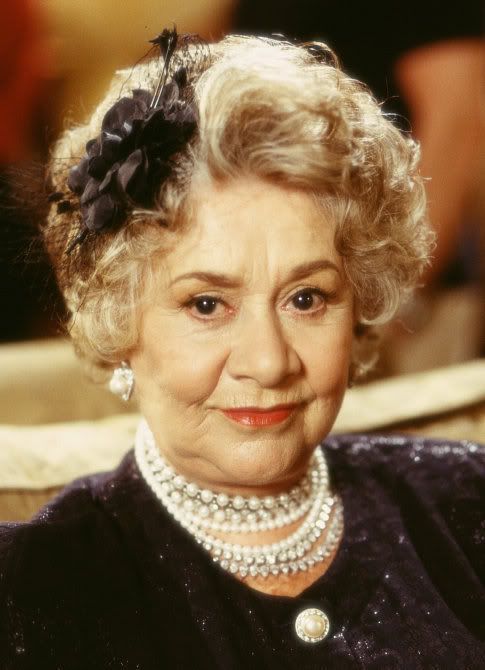

...Joan Plowright in Enchanted April (1992)
approximately 23 minutes and 35 seconds
19 scenes
roughly 25% of film's total running time
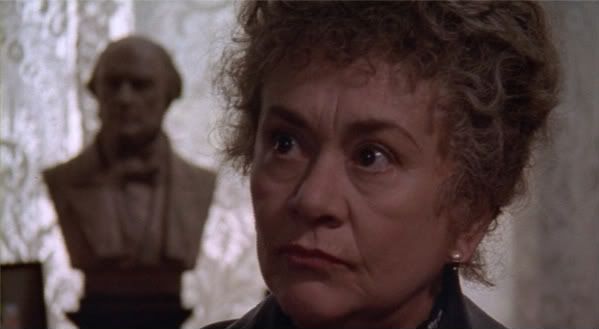 Plowright's Mrs. Fisher is, quite simply, insufferable. Indeed, at nearly every moment, Plowright's Mrs. Fisher reveals herself to be either...
Plowright's Mrs. Fisher is, quite simply, insufferable. Indeed, at nearly every moment, Plowright's Mrs. Fisher reveals herself to be either...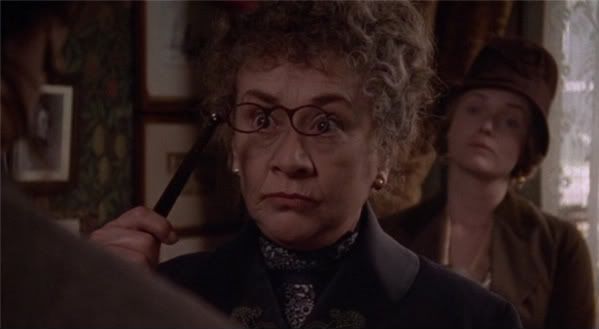 a pedantic prig, or...
a pedantic prig, or...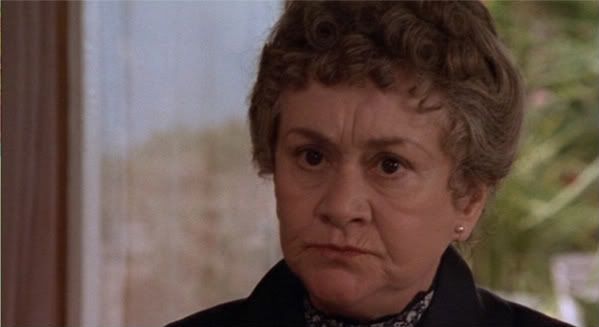 a crabby curmudgeon, or...
a crabby curmudgeon, or...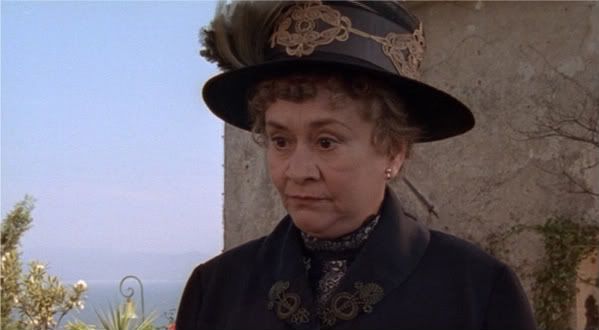 a selfish simp, or...
a selfish simp, or...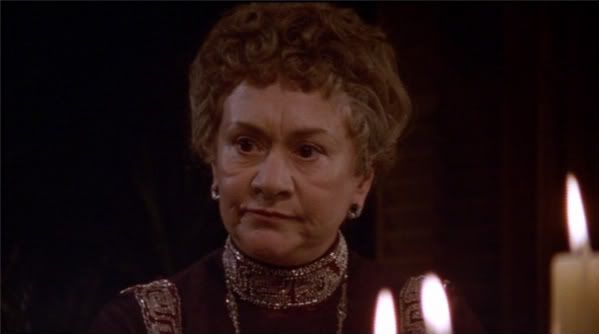 some exhausting combination of all of the above. Yet, Plowright's skill in the role, however, derives from her capacity to texture each of these awful affects with a punctuating glimpse of Mrs. Fisher's essential, defining loneliness. Mrs. Fisher is desperately melancholy, unhappy in her life and yet uncertain or unwilling to make any meaningful change in how she lives her life.
some exhausting combination of all of the above. Yet, Plowright's skill in the role, however, derives from her capacity to texture each of these awful affects with a punctuating glimpse of Mrs. Fisher's essential, defining loneliness. Mrs. Fisher is desperately melancholy, unhappy in her life and yet uncertain or unwilling to make any meaningful change in how she lives her life.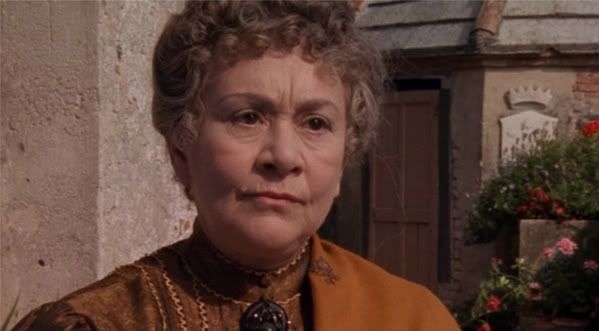 Of course, even Plowright's Mrs. Fisher falls sway to the "enchantment" that is central conceit of this benign little piece (a made-for-tv movie in the UK, repackaged as a theatrical release in one of the earliest years of Mirmax's British obsession). As the magic of this Italian estate finds its way into the hearts of the four vacationing women, they each find themselves newly capable of freeing themselves of their rigid views about men and relationships and, thus, opening themselves to experiencing the joys of life.
Of course, even Plowright's Mrs. Fisher falls sway to the "enchantment" that is central conceit of this benign little piece (a made-for-tv movie in the UK, repackaged as a theatrical release in one of the earliest years of Mirmax's British obsession). As the magic of this Italian estate finds its way into the hearts of the four vacationing women, they each find themselves newly capable of freeing themselves of their rigid views about men and relationships and, thus, opening themselves to experiencing the joys of life.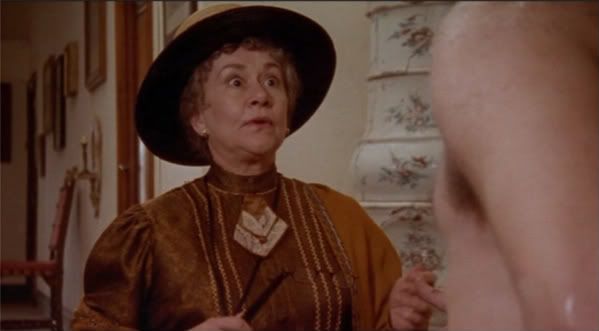 And among all the transformations, that experienced by Plowright's Mrs. Fisher is perhaps the most conspicuous.
And among all the transformations, that experienced by Plowright's Mrs. Fisher is perhaps the most conspicuous.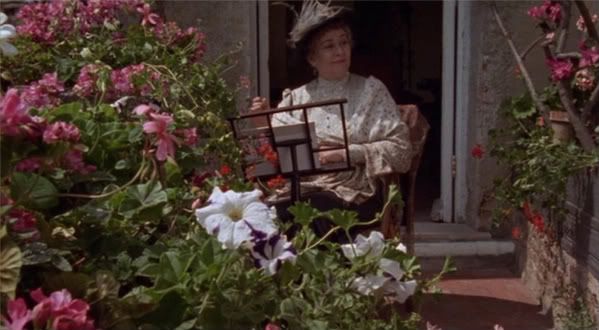 To her credit, though, in this light romantic fable, Plowright offers a simple -- but never glib -- depiction of Mrs. Fisher's emotional reawakening. As she develops this fairly simplistic character arc, Plowright permits Mrs. Fisher to be a coherent character. It might be easier to, as Josie Lawrence does, approach this character as an ugly ugly caterpillar becoming a pretty pretty butterfly.
To her credit, though, in this light romantic fable, Plowright offers a simple -- but never glib -- depiction of Mrs. Fisher's emotional reawakening. As she develops this fairly simplistic character arc, Plowright permits Mrs. Fisher to be a coherent character. It might be easier to, as Josie Lawrence does, approach this character as an ugly ugly caterpillar becoming a pretty pretty butterfly.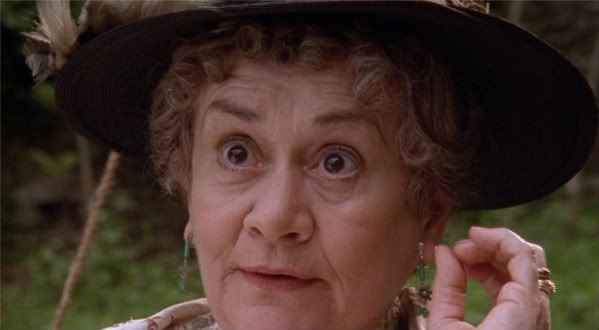 Plowright, however, adopts a more nuanced approach to the characterization. Indeed, what I most admire about Plowright's performance is how her Mrs. Fisher does not become a different person at all, just a much nicer and happier version of who she was all along.
Plowright, however, adopts a more nuanced approach to the characterization. Indeed, what I most admire about Plowright's performance is how her Mrs. Fisher does not become a different person at all, just a much nicer and happier version of who she was all along.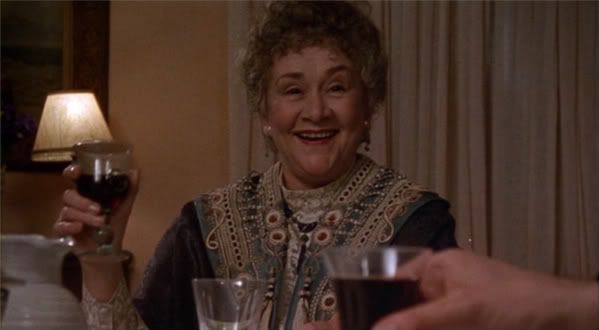 In Plowright's performance, Mrs. Fisher emerges as a woman who, through the course of events in the narrative, chooses to use her formidable powers of wit, personality and intelligence for good rather than for evil. And in so doing, Plowright's Mrs. Fisher emerges as the person most transformed by her "enchanted" April in Italy.
In Plowright's performance, Mrs. Fisher emerges as a woman who, through the course of events in the narrative, chooses to use her formidable powers of wit, personality and intelligence for good rather than for evil. And in so doing, Plowright's Mrs. Fisher emerges as the person most transformed by her "enchanted" April in Italy.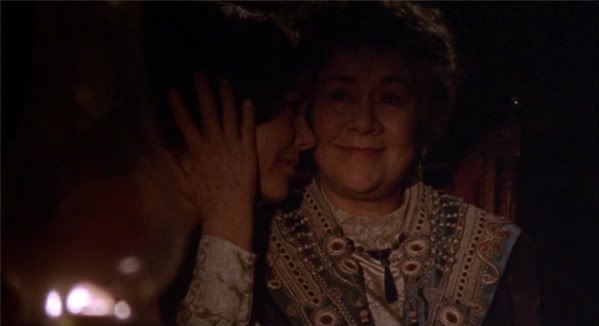 Plowright deftly develops a substantial emotional foundation for Mrs. Fisher, one which subtly amplifies the emotional impact of the fanciful romantic reverie narrated by the film. The character is an "old-school" Supporting Actress type -- the sort that might have, in an earlier era, been played by Maria Ouspenskaya, Edna May Oliver or Dame May Whitty -- and Plowright's performance offers a deftly humanizing spin on this utterly conventional character.
Plowright deftly develops a substantial emotional foundation for Mrs. Fisher, one which subtly amplifies the emotional impact of the fanciful romantic reverie narrated by the film. The character is an "old-school" Supporting Actress type -- the sort that might have, in an earlier era, been played by Maria Ouspenskaya, Edna May Oliver or Dame May Whitty -- and Plowright's performance offers a deftly humanizing spin on this utterly conventional character.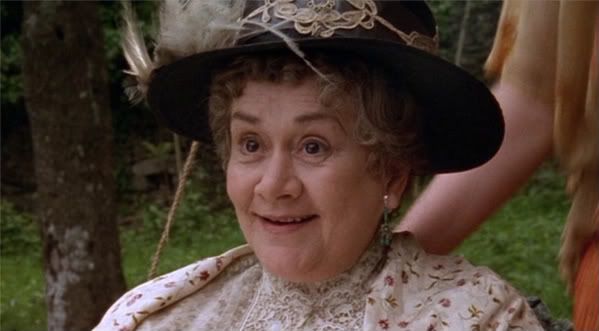 Plowright's peformance marks a subtle accomplishment in a largely unsubtle film.
Plowright's peformance marks a subtle accomplishment in a largely unsubtle film.

2 comments:
I still remember my smile frozen in shock when I heard Marisa Tomei's name read off instead of Miss Plowright's name. I loved all the performances that year and it is one of the hardest to choose, but I picked Joan Plowright because she made me feel more than any other performer and I guess I am a sucker for any wife of Laurence Olivier.
I agree with your assessment of Joan, but I think Josie does more with the role than you give her credit for. In fact, when her husband asks why she hasn't been attractive until now, I found the whole thing bittersweet, because she HAD been attractive, he just never noticed. I didn't think Josie transformed much at all, just became more open with her emotions.
Post a Comment